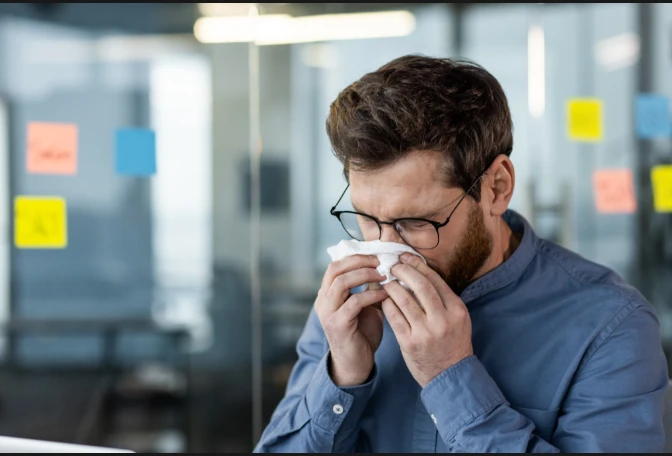Authored by Terrence Shenfield MS, RRT-ACCS, RPFT, NPS, AE-C
Allergies have become increasingly common, affecting millions of people worldwide. That annoying sneeze after stepping outside, or that itch after eating certain foods, can turn into much more than an inconvenience. But what actually causes allergies, and what can be done to manage them effectively without relying solely on medications?
This blog post explores common causes of allergies, dives into natural ways to treat allergies, and offers actionable allergy management tips to enhance your quality of life.
What Exactly Are Allergies?
Allergies occur when your immune system perceives a harmless substance, like pollen or pet dander, as a threat and overreacts. This reaction results in symptoms like sneezing, itching, rashes, or, in severe cases, difficulty breathing. Common allergens include:
- Pollen
- Dust mites
- Pet dander
- Mold
- Certain foods (e.g., nuts, shellfish, dairy)
The reaction your body has to these allergens is meant as a defense, but it often causes more harm than good. You’ll want to identify your triggers first to understand how best to manage your allergies.
Causes of Allergies
While genetics play a role in determining your susceptibility to allergies, environmental factors also contribute significantly. Key causes include:
1. Environmental Allergens
Outdoor elements like pollen and mold spores are notorious allergy culprits. They vary by region and even by season, making it vital to monitor local conditions. Tools like weather apps often include allergy alerts that can help you plan accordingly.
2. Dietary Factors
Certain foods can trigger immune responses, especially in those with sensitivities to nuts, seafood, dairy, or gluten. Even gut health plays a role in developing food-related allergies.
Reference tip: Learn more about common allergens and how to manage them on ATECAM's allergy page.
3. Indoor Triggers
Indoor allergens such as dust mites, mold, and pet dander can accumulate in poorly ventilated homes. Proactive steps like using HEPA filters or vacuuming frequently can mitigate these risks.
4. Pollution and Urban Living
Studies suggest that urban lifestyles, with increased exposure to pollution and chemical irritants, exacerbate allergic responses. This is especially evident in respiratory allergies like asthma.
Why Natural Allergy Remedies Matter
While medications like antihistamines provide quick relief, many seek natural allergy remedies to avoid side effects like drowsiness or dependency. Natural methods can also address the root cause rather than just alleviating symptoms.
6 Natural Ways to Treat Allergies
Here are effective, science-backed natural ways to treat allergies and keep symptoms under control.
1. Golden Rule: Identify and Avoid Triggers
The first step to allergy management is understanding your triggers. Allergy testing can help pinpoint what sparks your symptoms, allowing you to create a game plan for avoidance.
2. Improve Air Quality at Home
- Invest in a HEPA air purifier
- Keep humidity levels below 50% to reduce mold growth
- Consider natural air purifying plants like Boston ferns
3. Explore Herbal Remedies
Herbs like butterbur and quercetin are gaining traction as effective natural allergy remedies. They work by stabilizing histamine release, which is responsible for many allergy symptoms. Always consult your healthcare provider before trying new supplements.
4. Strengthen Gut Health
The gut plays an integral role in immune function. Incorporating probiotics from yogurt, kefir, or supplements can boost your gut microbiome and potentially reduce allergies.
5. Try Saline Nasal Irrigation
Rinsing your nasal passages with a saline solution can clear out allergens and provide relief from congestion or irritation.
6. Adopt a Clean Diet
Anti-inflammatory foods like turmeric, ginger, and green leafy vegetables can help your body manage allergic reactions. Avoid processed foods that may exacerbate inflammation.
Learn more about evidence-based natural health approaches by exploring resources at ATECAM's website.
Allergy Management Tips for Everyday Life
Managing allergies is an ongoing process that requires adjustments to your lifestyle. Here’s how you can make practical changes that stick.
Make Your Home Allergen-Free
- Wash bedding weekly in hot water to eliminate dust mites.
- Remove or regularly clean heavy drapes and carpets that trap allergens.
- Use eco-friendly cleaning products to avoid chemical irritants.
Stay Ahead of Allergy Seasons
Seasons like spring often amplify symptoms due to high pollen counts. Keep track of local forecasts and take antihistamines or adopt natural remedies proactively.
Community Is Key
Join groups or forums where you can share experiences and learn from others. A strong support system can provide valuable allergy management tips and encouragement.
When to Seek Professional Help
While managing allergies naturally is beneficial, consult a healthcare provider if symptoms persist or worsen. Chronic allergies or severe reactions may require treatments like immunotherapy or specialized medications.
For further insight on advanced treatments and wellness solutions, visit our allergy category page.
Where to Start Your Allergy Journey
Taking control of your allergies naturally is achievable with the right knowledge and tools. Whether it’s through identifying your triggers, adopting herbal remedies, or improving indoor air quality, every step you take brings you closer to lasting relief.
If you're ready to unlock reliable natural allergy remedies and explore trusted health education, start with ATECAM. Your wellness starts here.
References
- National Center for Complementary and Integrative Health (NCCIH). "Herbal Remedies for Allergies."
- American College of Allergy, Asthma & Immunology (ACAAI). "Environmental Allergy Triggers."
- Harvard Health Publishing. "The Role of the Gut Microbiome in Health."
- Mayo Clinic. "Tips for Allergy-Proofing Your Home."
- National Institutes of Health (NIH). "Exploring Probiotic Benefits in Allergies."



